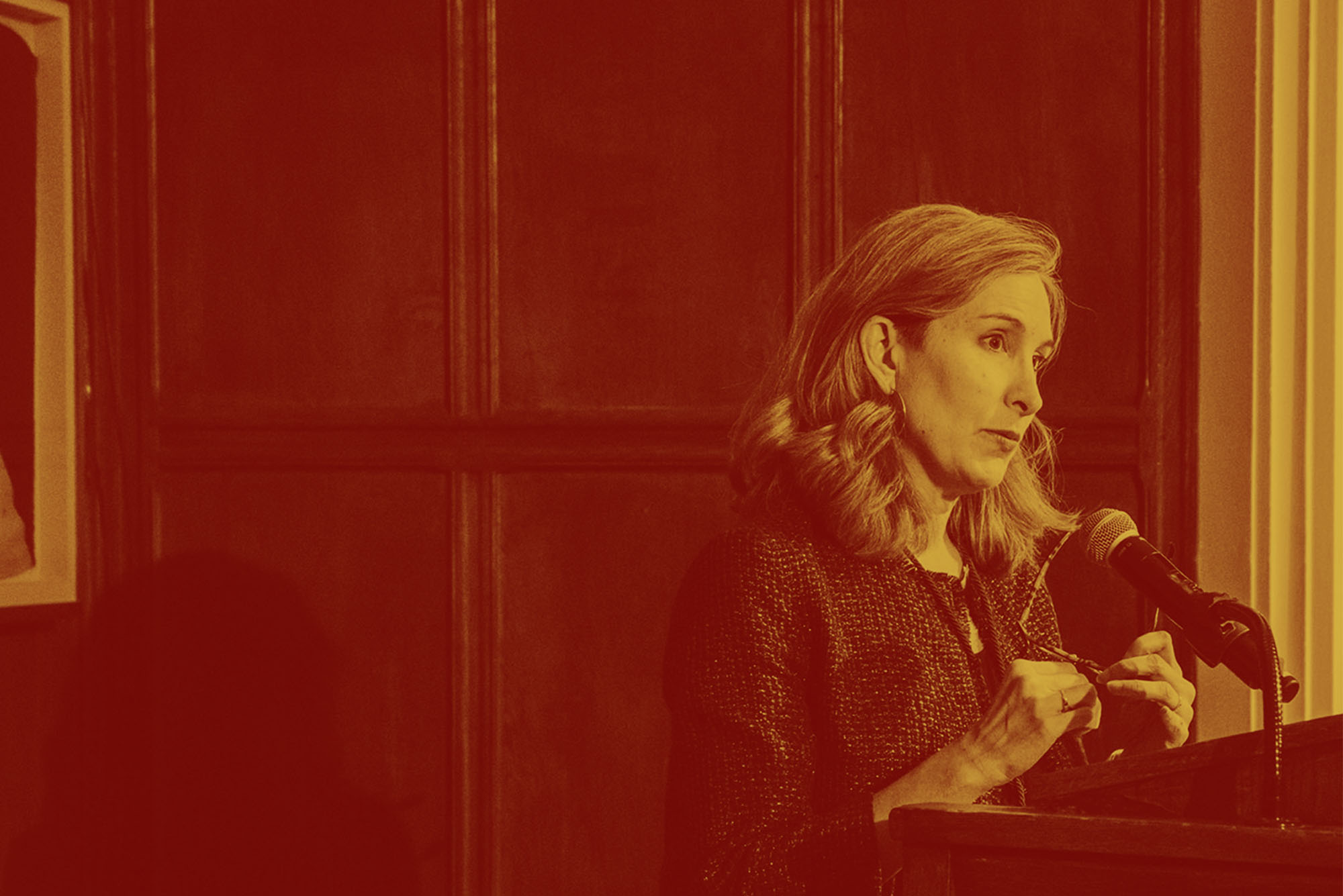My Big Idea: Blending Wildlife Conservation and Human Welfare

As founder of OneNature, Beth Allgood (MET’93) was awarded a spot last year on the Explorers Club list of “Fifty People Changing the World.” Photo by Peter Domorak, the Explorers Club
Blending Wildlife Conservation and Human Welfare
Beth Allgood (MET’93), founder of OneNature, is working toward an approach that is better for people and nature
In our My Big Idea series, we bring you interviews with BU alums and other members of the University community who have launched a business, built a new product, or solved problems big and small. We ask them how they got the idea, what were their biggest stumbling blocks, and what’s next for their big idea.
Beth Allgood’s résumé brims with (almost) more big-name conservation groups than a jungle has animals: International Fund for Animal Welfare, World Wildlife Fund, National Wildlife Federation, the Nature Conservancy.
In 2020, Allgood (MET’93) founded her own nonprofit: OneNature. As executive director with five employees—“though none of us is fully paid”—she oversees the Maryland group’s blending of animal conservation with human welfare. The goal, she says, is “human well-being as a complement and alternative to purely economic and biological approaches” to protecting wildlife.
Maryland-raised Allgood worked briefly at a D.C. think tank after her undergraduate years at James Madison University in Virginia. “The nonprofit managers I knew were passionate and brilliant, but not very skilled managers, and I wanted to bridge that gap,” she says. That drew her to the BU Metropolitan College master’s program in management in Rome. “I loved my time in Rome and in the program,” she says. “I learned all aspects of business management that I am using today.” It was a job as an account executive later with the National Wildlife Federation that sparked her interest in conservation. (She’s also had stints with USAID and the Peace Corps.)
Last year, the Explorers Club, an international group supporting scientific expeditions, gave her its annual nod as one of 50 people “changing the world [who] the world needs to know about.”
Q&A
With Beth Allgood
Bostonia: We think of conservation as benefiting wildlife, not humans. What does OneNature do, and how do those projects benefit both?
Historically, conservation has been focused on protecting wildlife and wild places from people. There are now beautiful national parks in more than 100 countries, but this model has had some negative impacts on people, especially people who had developed cultures and practices that were intertwined with some of these places that were now off-limits to them. In fact, the conservation sector, like many sectors of society today, is grappling with a history of colonialism and social injustice, along with a growing biodiversity extinction crisis. It is time to rethink an approach that is better for people and nature.
When communities are excluded from decision-making about their local environment, you can get projects that communities didn’t want and don’t sustain—projects that reflect what the project implementers think communities should want—and human rights violations in extreme cases. Meanwhile, animal suffering and the extinction and climate crises continue to accelerate.
I started OneNature because I wanted to explore ways that connections with wildlife contribute to human well-being—economically, spiritually, and culturally. I believe that understanding and expanding the connection between people and wildlife is key to supporting communities around the world that are stewarding wildlife. I think we can also learn from these communities and establish or reestablish a sense of connection in the more economically developed world.
Bostonia: Can you give some examples?
One of my favorite projects at OneNature was creating a collaborative research project with 10 conservation groups from around the world that are working with communities with spiritual and ancestral connections to wildlife species like elephants, bonobos, and snow leopards. Together, we analyzed common elements of using this approach to underpin conservation efforts. We have submitted the resulting paper for publication.
OneNature has also partnered with Happiness Alliance, a leading expert in data-driven, community well-being measures, to develop a holistic approach to support conservation projects’ long-term sustainability and effectiveness. Through our Wild Happiness approach, we offer training, tools, and hands-on support that help conservation practitioners measure and integrate community well-being and values with holistic conservation outcomes that benefit wildlife and people and include diverse community perspectives.
We piloted our Wild Happiness survey in 2023 with a Maasai community in Kenya. The average scores for satisfaction with life, psychological well-being, and social support were much higher in this community than the international averages. [Yet] satisfaction in the economy domain is much lower than global averages. People in the community reported that they are going hungry twice a month (on average) because of a lack of access to food or money. The average level of satisfaction with living with wildlife was neutral—with a wide range of responses that reflected both cultural connections with wildlife and potentially life-threatening conflict with wildlife. This information provides indications of how to design interventions that improve life for the people in this community.
Bostonia: How hard was it to pitch this approach in the beginning to secure funding?
It was, and still is, a struggle to secure funding. There is a growing understanding about how important well-being is and that our connections with wildlife go beyond the economic lens alone. But it has been hard to get enough funding to include this approach in projects. We have several exciting projects that are ready to go as soon as we get funding, including with communities living near mountain gorillas, snow leopards, and elephants. I think conservation partners and funders will see that this approach will improve their projects and ultimately make them more effective for people and biodiversity in the long run.
Bostonia: Where did you get the idea?
In 2009, I had a baby and some personal health challenges. I started delving into well-being as a measurement of success. What matters at an individual level goes beyond the personal to the system level. I learned about Gross National Happiness in Bhutan, an approach that emphasized growing well-being over growing the economy. And I thought that a more holistic approach to policies would help people and wildlife. Family, purpose, health, animals, and nature matter to most people around the world, yet our systems don’t reflect that.
Bostonia: Give us your elevator pitch: Why support OneNature as opposed to other conservation groups?
I wouldn’t suggest supporting OneNature instead of other conservation groups. Our approach requires the partnership of conservation partners on the ground and is intended to improve the social, financial, and environmental sustainability of the projects.
We integrate social science strategies and natural science outcomes to help guide project planning and implementation toward greater sustainability by creating and maintaining measurable benefits for community well-being. We ask about individual and community values for the wildlife in these communities and provide analysis and recommendations directly relevant to the overall assessment. We use the results to help our partners cocreate solutions with communities and then monitor project impacts throughout the life of the project. This approach facilitates deeper cocreation conversations and project planning between communities and conservation organizations.
Bostonia: What was your biggest failure or mistake?
There are so many things I wish I had done differently, but I think I had to make the mistakes in order to learn from them. I wish I had secured some funding before launching. I also tried to do everything all the time, and it was very easy to burn out that way. I have had to learn that rest and turning off the work brain is critical to staying engaged, enthusiastic, and creative.

Bostonia: Any tips for other people hoping to launch nonprofits?
I joined my state’s nonprofit association, which has a ton of resources. I had to be pretty scrappy and found ways to get grants for Office 365 from Microsoft and free phone service from Ninja Number. I have used TechSoup for nonprofit discounts on tech services and project support from Tap Root, which connects pro bono business volunteers with nonprofits like mine. I also have had incredible support from interns, most of whom got class credit for their work. I have collaborated on research papers with incredible people that have been published in peer-reviewed journals. All without requiring funding.
I have also started two accountability/support groups: one of the women “leaders” in my neighborhood, in which we meet for breakfast once a month. The other with executive directors of small conservation nonprofits. We meet online monthly. Those really help keep me focused and connected when working from my home office all the time.
Bostonia: What’s your favorite part of working with OneNature?
I absolutely love the work. I love researching and learning more about the connection between people and wildlife, hearing stories of this connection, and trying to develop practical tools to help organizations implement the research findings. I love presenting it to audiences that may not be aware of the connection and amplifying and connecting people with stories from the field. I also love working with other people who are passionate about the work. My network and partners are some of the most incredible, passionate, and creative people in the world.


Comments & Discussion
Boston University moderates comments to facilitate an informed, substantive, civil conversation. Abusive, profane, self-promotional, misleading, incoherent or off-topic comments will be rejected. Moderators are staffed during regular business hours (EST) and can only accept comments written in English. Statistics or facts must include a citation or a link to the citation.